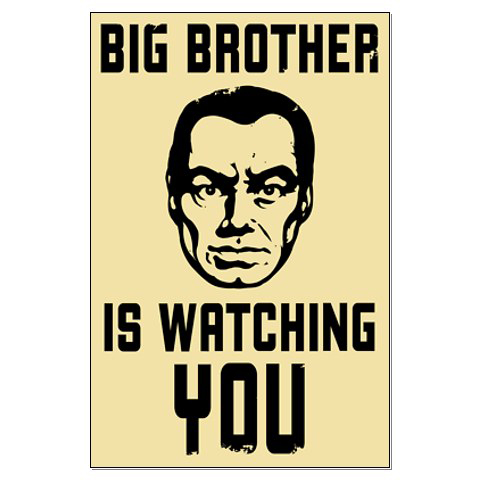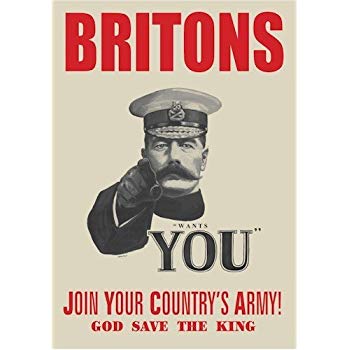Which Brother is watching you? 1984 is 70 years old today.

The face on this poster can be endlessly exchanged and manipulated. I’m not one for endless appropriations of Orwellian imagery and it seems to me that the face of Big Brother has to mean something more than a particular politician that you don’t like very much.
Oddly enough I always saw face of Big Brother as Lord Kitchener, plagiarised and re-purposed. Of course in Foucauldian/Benthamite terms, there really doesn’t have to be a Big Brother so long as the sense of surveillance is fully internalised. Indeed, O’Brien pretty much admits there’s no Big Brother.
‘Will Big Brother ever die?’
‘Of course not. How could he die?’
That which can never die has never lived. So rather and try identify Big Brother with any actual human face, it seemed to me that the appropriation of Lord Kitchener’s recruiting poster would be the perfect way of representing the Ingsoc attitude to history.

Also, a reworking of this poster for use in 1984 would only demonstrate the shortness and fragility of historical memory with nobody saying out loud (and perhaps nobody even thinking) “Big Brother is just Kitchener reworked”.
So how close are we to 1984 here in 2019? Well, certain things have worked out “interestingly”. All the stuff about a surveillance society has been pondered to death in recent years. Technology has robbed us of guiltless solitude to a significant extent.
1984 style political lying is rather pertinent right now. The ruler of Oceania in 2019 is a delusional liar who believes that anything that suits his political purposes at any given moment is indistinguishable from objective truth. The most likely satrap of Air Strip One is also a habitual liar, but he’s a more of a deliberate liar who despises Air Strip One and everyone living in it as exploitable imbeciles who deserve nothing better than lies. Insofar as both Trump and Johnson actually exist, neither of them much resemble Big Brother who – in Feuerbachian terms – is Divinity dissolved into the predicate of a sentence. Big Brother is… that which makes for… certain possibilities.
Of course the large scale ego weakness that leads to transparent lies becoming embraced as the transcendent will of the party has never been more prevalent. What we don’t yet have, of course, is the hegemony of any one echo chamber. More and more people seem to be trapped in by network of ideological self reinforcement, but no western nation has yet organised itself to build an echo chamber that holds everybody.
We’re not in Orwell’s dystopia and we shouldn’t pretend we are. We are, however, in a world in which various Orwellian concepts have evolved separately to the point where they could be used to weave together different dystopian futures – all very horrible – but not what Orwell described. Critical reading of 1984 does not vindicate either despair or complacency.
One thing, oddly enough, that I think Orwell is wrong about is an important aspect of the idea of Newspeak. Syme describes Newspeak lovingly as follows…
‘It’s a beautiful thing, the destruction of words. Of course the great wastage is in the verbs and adjectives, but there are hundreds of nouns that can be got rid of as well. It isn’t only the synonyms; there are also the antonyms. After all, what justification is there for a word which is simply the opposite of some other word? A word contains its opposite in itself. Take “good”, for instance. If you have a word like “good”, what need is there for a word like “bad”? “Ungood” will do just as well — better, because it’s an exact opposite, which the other is not. Or again, if you want a stronger version of “good”, what sense is there in having a whole string of vague useless words like “excellent” and “splendid” and all the rest of them? “Plusgood” covers the meaning, or “doubleplusgood” if you want something stronger still. Of course we use those forms already. but in the final version of Newspeak there’ll be nothing else. In the end the whole notion of goodness and badness will be covered by only six words — in reality, only one word. Don’t you see the beauty of that, Winston? It was B.B.’s idea originally, of course,’ he added as an afterthought.
The idea that people are expressively incapacitated by the reduction of vocabulary isn’t actually true. If having a word for everything made you more imaginative then German would be the most poetic language on earth. Europeans meeting native North Americans for the first time noted how poetic most people seemed to be – and their poetic modes of expression were based on a restricted vocabulary which enforced a need for metaphor and metanym on a daily basis. If you’re not labeling everything then you need to think harder about what things are “like”.
Moreover a poet like Wordsworth made extensive use of the word “thing” along with various periphrases that created a poetry out of rejecting the specificity of terminology. Wordsworth would be able to create poetry from Syme’s Newspeak dictionary.
Jargon and managerialese can certainly be oppressive and can certain help to warp and wither the imagination. But these corrosive “languages” actually tend to expand rather than contract. As Foucault himself said: “repression is productive”. I worry that the forms of Newspeak that we want to worry about are nothing like the version that Orwell suggested.
So, doubleplusgood 1984 anniversary everybody – everywhere.
Reblogged this on conradbrunstrom and commented:
Blogged this a year ago…